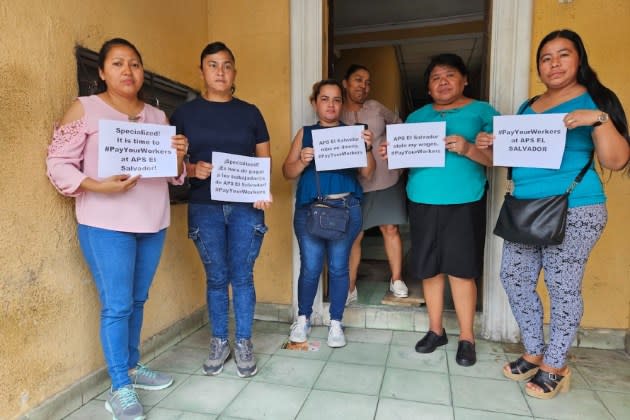Hanesbrands Named in WRC Report for Nonpayment of Worker Wages at Central American Factory

Central American garment workers who produced goods for companies like Hanesbrands and Gildan Activewear have been illegally denied $2 million in compensation since factory they worked at shuttered two years ago.
A report released by the Worker Rights Consortium (WRC) this week revealed that back wages, severance and other benefits were unlawfully withheld from 831 workers at the APS factory in the town of Ilopango, El Salvador after the facility went out of business, as determined by the Salvadoran Ministry of Labor.
More from Sourcing Journal
The employees in question had been manufacturing clothing for Hanesbrands subsidiary Champion as well as Gildan’s house brand, along with biking apparel for California brand Specialized Bicycle Components.
After WRC engaged with the case, Gildan, along with lesser-known brands Kellwood and Alwants, agreed to pay workers $1.34 million, or two-thirds of the outstanding balance. With $659,000 yet unpaid, WRC said Hanesbrands has forked up a “miniscule” sum to make the workers whole, while Specialized has not offered anything at all.
In the months since the factory went under, workers have reported significant hardships due to the nonpayment of wages and benefits, from the inability to pay rent to lapsed utility bills and school fees. Some have gone without necessary medical care, and others have gone hungry. Former APS employee Ana Cecilia said she is still struggling to put food on the table. “My kids and I are only able to eat rice, beans and eggs,” she added.
El Salvador’s labor laws stipulate that workers must immediately be paid all wages and terminal compensation upon a factory closure. What’s more, supplier codes of conduct for major apparel firms including Hanesbrands require that workers in the supply chain receive all legally mandated wages and benefits.
“We are waiting for APS to pay us the money they owe us,” another former worker at APS said.
Specialized, which has shrugged off the past-due bills and declined to respond to communications on the issue, claims to promote human rights in its supply chain as a part of its sustainability strategy. Hanesbrands, too, has claimed to engage directly with its value chain to ensure social compliance. “However, both companies’ willingness to see these standards violated and refusal to engage with the vulnerable workers who made their products suggest otherwise,” WRC wrote.
Social impact group Green America, a member of the Clean Clothes Campaign (CCC), has signed on 30 organizations to support APS workers, delivering 10,000 petitions with the goal of pushing Hanesbrands and Specialized to cough up the funds. But after the group delivered petitions to Specialized’s Morgan Hill, Calif. headquarters, the biking brand blocked the email domains of the organizations reaching out on the workers’ behalf.
“We stand in solidarity with the garment workers of El Salvador to advocate for wage justice,” Green America labor justice campaigns director Jean Tong said, noting that consumers can play a role in pushing corporations to act ethically. “By choosing where we spend our money, we can encourage businesses to adopt fair labor practices,” she said. “We urge Specialized and Hanes to immediately join other companies that have committed to accountability and pay the workers for their labor.”
Former Specialized brand ambassador Eric Arce said, “No rider wants to be complicit in workers’ exploitation.”
“As cyclists, we have a powerful platform to advocate for justice within the bicycle supply chains,” he added. “Wearing a Specialized bike jersey should symbolize our commitment to the sport and our trust in the company, including its value to promote human rights along its supply chain.”
“By speaking out against wage theft and demanding transparency, we contribute to a cycle of respect and dignity for all workers involved in making our rides possible,” he added.

